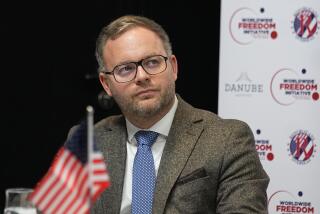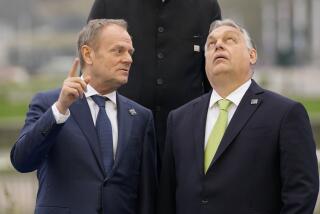Back Gorbachev, Hungary Urges Bush : East Europe: Soviet stability would benefit the region, and the U.S. can help, the nation’s new non-Communist president says.
- Share via
WASHINGTON — Hungary’s new non-Communist president on Thursday urged the Bush Administration to lend more support to Soviet President Mikhail S. Gorbachev in an effort “to preserve the stability of the Soviet Union.
“It would be to the benefit of all of Eastern Europe . . . if the Soviet Union maintained its stability in a way in which the Baltic states could also gain their independence,” President Arpad Goncz told reporters. “The United States should shape its policies accordingly. The United States should think several steps in advance. . . . This means U.S. support for Gorbachev.”
His comments, which U.S. officials said were similar to other messages from the newly democratic governments of Eastern Europe, reflected an apparent paradox: After struggling for years to win their independence from the Soviet Union, the region’s new anti-Communist leaders are now increasingly concerned about the prospect of instability in their giant neighbor.
Hungary could suffer “serious economic problems if the Soviet Union disintegrates,” said Goncz, who called Gorbachev “the most significant statesman of our century, without whom the changes in Eastern Europe would not even have begun.”
Goncz said Hungary supports the efforts of the Soviet Union’s three Baltic republics to gain independence--but put noticeably more emphasis on the need to preserve stability in Moscow.
Bush Administration officials said they see no conflict between Goncz’s comments and the Administration’s policy of trying cautiously to support Gorbachev’s reform program.
Echoing Czechoslovak President Vaclav Havel, who delivered a similar message to the Administration in February, Goncz said the new democratic governments of Eastern Europe want Gorbachev’s reform program to succeed.
“The United States should help the completion of the reform process in the Soviet Union,” he said. “Our own experience is that half-reforms are not genuine reforms.”
Goncz said he plans to carry his views on U.S.-Soviet relations to Bush when the two presidents meet today.
He said he also plans to ask Bush to seek assurances from Gorbachev, at the upcoming U.S.-Soviet summit meeting, that the Soviet Union will continue withdrawing its troops from Hungary.
Goncz, who was named interim president 10 days ago, is expected to be elected chief of state formally by Hungary’s Parliament next month.
A playwright and democratic activist who was imprisoned for five years after Hungary’s 1956 anti-Communist rebellion, Goncz said he is not seeking additional economic aid from Bush.
But he added with a wry smile: “Of course, if the United States decided to offer more assistance to Hungary, we would not refuse.”
He described the Hungarian economy as “convalescing. . . , serious but not hopeless.”
He said he will seek U.S. permission to open a Hungarian consulate “on the West Coast . . . to mobilize the business community for ventures in Hungary.” Budapest hopes to put the consulate in Los Angeles, another Hungarian official said, “but that depends on what the U.S. government says.”
More to Read
Sign up for Essential California
The most important California stories and recommendations in your inbox every morning.
You may occasionally receive promotional content from the Los Angeles Times.














